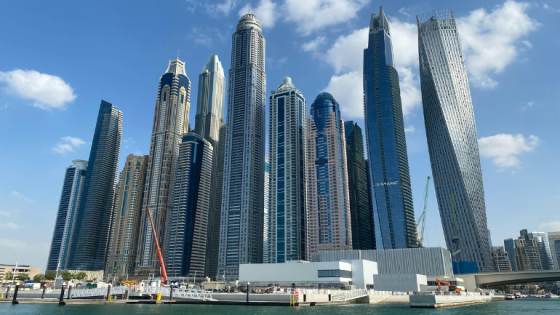Contents
- 1 Commercial Leasing UAE Law
- 2 UAE Commercial Leasing Laws: Maintenance and Repair Rental Issues
- 3 Key Factors to Consider Before Signing a Commercial Leasing Agreement in the UAE
- 4 Exploring Tenant’s Rights & Obligations Under UAE Commercial Leasing Laws
- 5 Commercial Leasing Regulations in the UAE
- 6 A Complete Guide to UAE Commercial Leasing Increase Regulations
- 7 Commercial Leasing Termination and Renewal Under UAE Laws
- 8 Dispute Resolution in Commercial Leasing UAE Agreements
- 9 The Role of Security Deposits in Commercial Leasing UAE Laws
- 10 The Legal Implications of UAE Subleasing
- 11 Key Concerns for Foreign Businesses Renting UAE Commercial Properties
- 12 Recent Updates and Modifications to UAE Commercial Leasing Laws
- 13 Renting Vs Commercial Leasing UAE Properties in Dubai
- 14 Types of Commercial Leasing in Dubai
- 15 Leasing Commercial Properties in Dubai
- 16 Rent Payment for Leased Commercial Property in Dubai
Commercial Leasing UAE has many leading property leasing business options in Dubai, showcasing tax policies, infrastructure, transparency in processes, and cutting-edge commercial buildings, just a few of the features that make it an appealing option. Businesses looking to lease a commercial space in Dubai must go through a certain process and meet the government’s eligibility requirements.
We will go over all of the methods, requirements, and other aspects involved in commercial properties for rent in Dubai, UAE, as well as clarify the difference between lease-and-rent commercial property in Dubai and commercial real estate services. This article offers an overview of commercial lease regulations in the United Arab Emirates. It seeks to provide readers with an overview of the country’s legal system governing commercial property leases.
Read more: Market Research UAE: Unveiling Dynamics of Dubai’s Business Landscape
Commercial Leasing UAE Law
Commercial lease regulations in the United Arab Emirates play an important role in regulating landlord-tenant relationships. These laws are intended to protect the rights and interests of both parties, resulting in a fair and transparent leasing procedure. Freedom of contract is a basic principle of UAE commercial real estate in Dubai and lease regulations. This means that landlords and renters are free to negotiate and agree on the terms and conditions of their lease agreement. However, this freedom is not unlimited, as certain necessary clauses must be included in all business lease agreements.
One such stipulation is the lease’s duration. According to UAE real estate law, a business leasing commercial arrangement must be for at least one year. This guarantees that all parties have enough time to set up and execute their enterprises. In addition, the lease agreement must identify the rent amount, payment periods, and any late payment penalties.
Rent hikes are an important part of UAE commercial lease rules and renting commercial properties for rent in Abu Dhabi. While landlords have the freedom to raise the rent, they must follow certain guidelines. According to the law, the rent can only be increased once every three years, and the increase cannot exceed 20% of the current rate. This law prohibits landlords from imposing excessive rent increases on their tenants.
Read more: Employee Compensation UAE: A Complete Guide to Labour Laws and Benefits for Optimal Employment
UAE Commercial Leasing Laws: Maintenance and Repair Rental Issues
Commercial lease rules in the UAE also cover maintenance and repairs. According to the legislation, the landlord is responsible for keeping the leased property in excellent shape. This involves ensuring that any necessary repairs are completed promptly. Tenants are expected to take reasonable care of the property and report any damages or maintenance issues to the landlord.
In the event of a dispute between landlord and tenant, the UAE’s commercial lease rules provide a framework for resolution. Both parties are encouraged to try to settle the problem amicably through negotiation or mediation. If a resolution cannot be achieved, either side may file a case in the appropriate court. It is crucial to remember that the UAE has specialist courts, such as the Dubai Rental Issues Centre, which only handles rental issues.
To summarize, commercial lease regulations in the UAE are intended to protect the rights and interests of both landlords and tenants. These rules promote a fair and transparent leasing procedure, including regulations for lease duration, rent increase restrictions, maintenance obligations, and dispute resolution. Understanding the fundamentals of commercial lease regulations in the UAE allows landlords and renters to manage the leasing procedure with confidence and clarity.
Read more: Business Opportunities UAE: Profitable Ideas for Successful Businesses in Dubai
Key Factors to Consider Before Signing a Commercial Leasing Agreement in the UAE
Commercial leasing is prevalent in the UAE, with many global businesses preferring to rent office commercial spaces, retail stores, and warehouses rather than invest in their buildings in the commercial real estate market. However, before entering into a business lease agreement, both landlords and tenants must grasp the important criteria and legal issues involved. The lease’s duration is one of the most crucial factors to consider. Commercial leases in the UAE normally last one year, while longer lease lengths are occasionally common. To minimize future misunderstandings or disagreements, both parties must precisely state the lease’s duration and any renewal possibilities in the agreement.
Another important element to consider is the rent cost and payment schedule. The UAE has no rent control rules, which means landlords can determine the rent at their discretion. However, tenants must negotiate and agree on a fair rent sum that represents the property’s market value. Furthermore, the leasing agreement should explicitly state the payment terms, such as the due date, frequency, and permitted ways of payment.
Maintenance and repairs are important factors in commercial lease agreements. While responsibility for maintenance and repairs varies based on the lease terms, it is normally the landlord’s job to keep the property in excellent repair. Tenants are normally liable for any losses caused by their negligence or misuse. To avoid disagreements or confusion, both parties’ responsibilities must be explicitly defined in the leasing manager agreement.
Read more: Employee Benefits UAE: A Comprehensive Guide to Employment Perks and Compensation
Exploring Tenant’s Rights & Obligations Under UAE Commercial Leasing Laws
Furthermore, it is critical to evaluate the permitted use of the leased property. The lease agreement should specify the property’s intended use, whether it is for office, retail, or industrial uses. To avoid legal complications or penalties, tenants must ensure that the approved use is in line with their business activity. Furthermore, any restrictions or limitations on the use of the property should be clearly stated in the agreement. In the UAE, landlords frequently ask for a security deposit from tenants.
The security deposit protects the landlord in the event of property damage or nonpayment of rent. The security deposit is normally comparable to several months’ rent and should be specified in the lease agreement. Tenants must understand the conditions under which the security deposit may be retained, as well as the process for returning it at the end of the lease period.
Finally, both landlords and tenants should be aware of the legal remedies available in the event of a disagreement or breach of the lease agreement. The UAE’s legal system is well-established and protects both parties. However, it is recommended that both parties get legal counsel and incorporate dispute resolution methods in the lease agreement, such as arbitration or mediation, and commercial properties for sale, to address any possible issues in a timely and cost-effective manner.
In conclusion, before signing a business lease agreement in the UAE, both landlords and tenants must carefully consider the major considerations highlighted. Both parties can ensure a smooth and mutually profitable leasing experience by discussing the lease duration, rent amount and payment terms, maintenance and repairs, permissible use, security deposit, and legal remedies.
Read more: UAE Career Development Opportunities; Job opportunities and development careers
Commercial Leasing Regulations in the UAE

Commercial lease regulations in the United Arab Emirates play an important role in regulating landlord-tenant relationships. These regulations define the rights and obligations of both parties, ensuring a fair and transparent leasing procedure. Understanding these laws is critical for tenants to safeguard their interests and avoid potential conflicts. Tenants in the UAE have specific rights under commercial lease rules that are intended to provide them with a secure and stable business environment. One of the most important rights is the ability to occupy the leased premises for the agreed-upon period. This means that once a lease agreement is signed, the tenant has the right to utilize the premises for the designated time frame without interference from the landlord.
Tenants have the right to use the leased premises without interference or harassment from the landlord. This includes the right to calm, undisturbed enjoyment of the land. Landlords are not permitted to access the property without prior notice or consent, except for emergencies or necessary maintenance. Furthermore, tenants have the right to request repairs and maintenance from their landlord. The landlord is required to keep the premises in habitable condition and to swiftly fix any difficulties that may emerge during the rental. Failure to do so may result in legal action from the renter.
Tenants, on the other hand, are subject to specific responsibilities under UAE commercial lease legislation. One of the main obligations is to pay the agreed-upon rent on time. Failure to pay rent might result in eviction and legal action. Tenants are also responsible for keeping the rented premises in fair shape, making minor repairs, and adhering to any rules and restrictions established by the landlord or appropriate authorities. To avoid future issues, tenants must understand their rights and obligations under UAE commercial lease legislation. In the event of a dispute, tenants can seek legal fairness through the proper means. The UAE has a well-established legal framework that ensures a fair and fast resolution of business lease disputes.
In addition to renters’ rights and obligations, it is worth noting the importance of lease agreements in the UAE. Lease agreements are legally binding documents that set forth the terms and conditions of the tenancy. These agreements should include the rent amount, payment schedule, lease period, and any other applicable stipulations. Tenants must thoroughly research and understand the contents of the lease agreement before signing it to ensure that their rights are safeguarded.
Read more: UAE Industry Trends; Forecast growth for ICT sector & Construction Market Size
A Complete Guide to UAE Commercial Leasing Increase Regulations
Commercial lease regulations in the UAE play an important role in regulating landlord-tenant relationships. These laws seek to establish a fair and balanced framework that safeguards both parties’ rights and interests. Rent rise restrictions are an important part of commercial lease regulations. In this detailed guide, we will look at the rent increase legislation in the UAE and highlight the essential aspects that landlords and tenants should be aware of. The UAE has particular legislation in place to control rent hikes for commercial buildings.
These rules are largely designed to prohibit arbitrary and exorbitant rent increases that may harm enterprises. According to the UAE Civil Code, landlords are forbidden from increasing the rent of a commercial property during the lease term unless the lease agreement specifically allows for such an increase. If the lease agreement does include a provision for rent increases, it must explicitly identify the terms and processes to be followed. The legislation requires that any rent increase be reasonable and consistent with market pricing.
Landlords cannot impose unreasonable rent increases on renters. Furthermore, the law requires that any rent increase be reported to the renter in writing, giving them adequate notice. The notice period for rent increases in commercial leases is usually three months. This gives renters enough time to review the proposed increase and make any required changes to their company’s operations. During this notice period, tenants can negotiate the planned increase with the landlord. If no agreement can be reached, either party may take the matter to the Rent Dispute Settlement Committee for a decision.
The Rent Dispute Settlement Committee is a specialized authority that handles rental issues in the UAE. It is an independent institution dedicated to resolving landlord-tenant problems fairly and impartially. When an increase issue is presented to the committee, it will evaluate the requested increase based on market rates, the condition of the property, and any improvements made by the tenant. The committee’s decision is binding and enforceable. It is vital to note that the UAE’s rent increase laws apply to both new and existing leases. Landlords cannot unilaterally raise rents during the lease term unless they follow the required legal processes. This gives tenants a sense of stability and predictability, allowing them to organize their company operations appropriately.
To outline, commercial lease regulations in the UAE provide a thorough framework for managing rent increases. These regulations seek to create a balance between the rights of landlords and renters, ensuring that rent increases are reasonable and per market rates. Understanding and following these standards allows landlords and tenants to maintain a fair and happy relationship during the lease term.
Read more: UAE Job Market Trends; job opportunities in demand in hiring market trends
Commercial Leasing Termination and Renewal Under UAE Laws
Lease termination and renewal can be a difficult process, especially for commercial leases in the United Arab Emirates. Understanding the laws and regulations governing lease termination and renewal is critical for both landlords and renters to facilitate a seamless transition and avoid legal issues. In this post, we will present an overview of UAE commercial lease legislation and describe how to handle lease termination and renewal under these rules. A commercial lease in the UAE is a contract between a landlord and a tenant to utilize a property for commercial purposes.
The lease’s terms and conditions are often detailed in a written agreement that both parties should thoroughly check and understand. It is crucial to remember that the UAE Civil Code governs commercial leases, and parties are generally free to negotiate lease terms as long as they do not violate the rules of the law. When a lease ends, both landlords and tenants have specific rights and obligations. A lease can be ended under UAE law by mutual agreement between the parties, the expiration of the lease term, or a court order in specific situations.
Both parties should clearly define the termination terms in the lease agreement to avoid future confusion or disagreements. If a tenant chooses to cancel the lease before the end of the agreed-upon term, they must submit it to the landlord with the notice time stipulated in the lease agreement. The notice period is usually three months, although it may be extended depending on the terms of the agreement. Failure to submit the required notice may render the tenant accountable for any financial losses sustained by the landlord as a result of the early termination.
On the other hand, if a landlord desires to terminate the lease, they must provide a valid reason as defined by law. Nonpayment of rent, breach of lease terms, or the landlord’s intention to use the property for their purposes are all valid causes for termination. In such circumstances, the landlord must give the tenant formal notice of termination, stating the reason and the notice time necessary. When renewing a lease, both parties should begin negotiations well in advance of the lease’s expiration date.
It is crucial to remember that the legislation does not require automatic renewal of commercial leases, and the renewal terms must be agreed upon by both parties. Renewal terms may include changes in rent, lease duration, or any other factors that require updating. During the bargaining process, both parties should get legal assistance to defend their rights and interests. To minimize future misunderstandings or arguments, all changes or amendments to the lease agreement should be documented in writing.
Finally, resolving lease termination and renewal by UAE legislation necessitates a full awareness of the legal framework, as well as the rights and obligations of both landlords and tenants. Both parties can ensure a seamless transition and avoid legal problems by carefully studying and discussing the lease agreement’s provisions, receiving legal counsel as needed, and recording any changes or amendments.
Read more: Working Hours Regulations UAE: Navigating Labour Laws for Employment Success
Dispute Resolution in Commercial Leasing UAE Agreements

Navigating Dispute Resolution in Commercial Lease Agreements in the UAE: Commercial lease agreements are an important part of doing business in the UAE. These agreements specify the terms and conditions under which a property is leased for commercial use. However, problems between landlords and renters can emerge, necessitating the implementation of effective dispute-resolution systems. The UAE’s business lease regulations are governed by Federal Law No. 5 of 1985, often known as the Civil Transactions Law. This statute establishes a framework for addressing disputes involving commercial lease agreements. To ensure that any problems are resolved smoothly and fairly, both landlords and tenants must understand their rights and obligations under this law.
One of the most important components of UAE business lease regulations is the requirement for written agreements. Under the Civil Transactions Law, all commercial leasing agreements must be in writing and signed by both parties. This ensures that both parties understand the lease’s terms and conditions, which helps to avoid future misunderstandings or disagreements. The first stage in resolving a conflict is usually for the parties involved to negotiate. This can be accomplished either directly or with the help of legal counsel. Negotiation seeks a mutually agreeable solution that benefits both sides. Both landlords and tenants must approach negotiations in good faith and be willing to compromise to reach a conclusion.
If mediation fails, the parties may decide to pursue arbitration. Arbitration is a more formal process in which an arbitrator or panel of arbitrators is chosen to hear the case and render a binding verdict. The arbitrator’s ruling is legally enforceable and can only be disputed under limited circumstances. Arbitration can be a speedier and more efficient alternative to litigation because it allows the parties to skip the lengthy judicial proceedings.
Litigation is the last resort for resolving business lease issues in the UAE. This entails taking the dispute to court, where a judge will hear it and render a verdict. The judge determines the outcome of litigation, which can be a lengthy and costly procedure. Before agreeing to proceed with litigation, both parties must carefully weigh the prospective costs and rewards.
In conclusion, navigating dispute resolution in commercial lease agreements in the UAE requires a thorough understanding of the applicable laws and the available options for resolving disputes. By following the proper procedures and seeking legal advice when necessary, landlords and tenants can ensure a fair and efficient resolution of any disputes that may arise. Whether through negotiation, mediation, arbitration, or litigation, the goal should always be to find a solution that protects the rights and interests of both parties involved.
Read more: Business Ownership UAE: A Guide to Foreign Companies Mainland Ownership
The Role of Security Deposits in Commercial Leasing UAE Laws
A security deposit is the amount of money that a tenant pays to the landlord at the start of the lease term. It provides financial protection for the landlord, shielding them from unexpected losses or missed rent. In the UAE, security deposits are commonly used in commercial lease agreements. The amount of the security deposit is typically chosen by the landlord and might vary depending on criteria such as property type, location, and the tenant’s financial situation. To avoid future problems, both parties should clearly state the amount of the security deposit in the leasing agreement.
When the lease period ends, the security deposit is usually refunded to the renter, as long as there are no outstanding rent payments or property damage. However, it is vital to understand that the landlord may remove any outstanding rent or repair charges from the security deposit before releasing it to the renter. Commercial lease laws in the UAE include specific standards and restrictions for security deposits. For example, the legislation requires that the security deposit not exceed the value of three months’ rent. This limitation guarantees that the security deposit is appropriate and does not constitute an undue financial burden for the tenant.
Furthermore, commercial leasing laws in the UAE compel landlords to keep the security deposit in a separate bank account. This technique ensures that the funds are kept safe and are easily available for return to the renter at the end of the lease term. It also bans landlords from using the security deposit for personal purposes. In the event of a dispute between the landlord and tenant regarding the security deposit, the UAE has established specialized rental dispute panels. These committees are responsible for resolving issues and ensuring that both parties are handled equitably. They have the authority to mediate, give rulings, and enforce the restoration of the security deposit if necessary.
Both landlords and tenants must be aware of UAE commercial lease rules for the leasing process to run smoothly and transparently. Landlords should be aware of their security deposit rights and obligations, and tenants should understand their deposit entitlements and return conditions. In conclusion, security deposits play an important part in UAE commercial leasing rules. They provide financial security to landlords and ensure that tenants meet their duties. By following the norms and regulations outlined in the UAE’s commercial lease legislation, landlords and renters can maintain a fair and mutually beneficial leasing agreement.
Read more: Business Mentorship UAE: Nurturing Success Through Expert Guidance in Dubai
The Legal Implications of UAE Subleasing

Subleasing is the practice of a tenant renting out all or part of their leased premises to another party. This might be a useful arrangement for renters who have extra room or want to split the expense of their lease. However, subleasing poses various legal issues that both tenants and landlords must understand. First and foremost, study the provisions of the original lease agreement. Many business lease agreements in the UAE forbid subleasing without the landlord’s prior written authorization. As a result, tenants must acquire authorization from their landlord before entering into any subleasing agreements. Failure to do so may result in legal consequences, including the termination of the lease.
After obtaining the landlord’s consent, tenants should create a sublease agreement that fully describes the sublease’s terms and circumstances. This agreement should include the period of the sublet, the rent amount, and any additional responsibilities or restrictions imposed on the subtenant. It is critical to ensure that the conditions of the sublease agreement do not contradict the original lease agreement.
From a legal standpoint, it is vital to clarify that the subtenant has no direct contact with the landlord. Instead, their relationship is with the tenant who is subleasing the space. This means that the subtenant’s rights and obligations are strictly limited to the provisions of the sublease agreement. If any problems emerge, the subtenant must discuss them with the tenant, who will then contact the landlord.
Landlords should also understand the legal ramifications of subleasing. While permitting subleasing might benefit landlords by helping renters meet their lease responsibilities, it is critical to maintain control over the process. Landlords should carefully analyze and approve sublease agreements to verify that they adhere to the conditions of the original lease agreement. Landlords should examine the financial ramifications of subleasing. It is typical for tenants to charge more rent to subtenants than they pay to the landlord. In such circumstances, landlords may choose to negotiate a portion of the sublease rent as additional income. This might be incorporated into the original lease agreement or negotiated separately with the tenant.
To summarize, understanding the legal ramifications of subleasing is critical for both renters and landlords in the UAE. Tenants must seek the landlord’s permission and create a complete sublease agreement that adheres to the provisions of the original lease. Landlords, on the other hand, should thoroughly study and approve sublet agreements to safeguard their interests. By following commercial lease rules and taking into account the legal ramifications, both parties can ensure a smooth and mutually advantageous subleasing arrangement.
Read more: Business Marketing UAE: Unlocking Digital Success in Dubai and Beyond
Key Concerns for Foreign Businesses Renting UAE Commercial Properties
Renting a commercial property in the UAE can be a profitable option for foreign companies wishing to grow their operations in the Middle East. Before entering a lease agreement, it’s important to understand the legal requirements associated with renting commercial property in the UAE. One of the first things foreign firms need to be aware of is the requirement for a local sponsor or partner. According to UAE law, foreign firms are not permitted to own land or property outright. Instead, they must enter into a partnership with a local sponsor, who will hold a majority ownership interest in the business. This local sponsor will also be responsible for getting the appropriate permits and licenses for the firm.
When leasing agreements, it is crucial to understand that the UAE does not have a distinct federal law governing commercial leases. Instead, each emirate has its own norms and legislation that govern lease arrangements. This means that the terms and conditions of a lease agreement can change based on the emirate in which the property is located. In general, lease agreements in the UAE are long-term, lasting 5 to 20 years. It is usual for landlords to want a hefty upfront payment, generally comparable to a year’s rent, as a security deposit. Additionally, landlords may require post-dated cheques for the full lease term as a guarantee of payment.
It is also critical to thoroughly analyze the terms and conditions of the leasing agreement. Some frequent conditions that foreign firms should be aware of include rent escalation clauses, which allow landlords to increase the rent on an annual basis, and renewal agreements, which detail the process for renewing the lease after the term. Another important factor for international enterprises renting commercial buildings in the UAE is the problem of subletting. In rare circumstances, landlords may restrict subleasing or seek prior approval before subletting the property. It is critical to clarify these provisions with the landlord before signing the lease agreement.
Foreign enterprises should be aware of their rights and responsibilities as renters. Tenants, for example, are responsible for the property’s maintenance and repairs. However, landlords are normally in charge of substantial structural repairs and maintenance. If a dispute arises between the tenant and the landlord, it is vital to understand that the UAE has a well-established legal system in place to settle such disputes. To guarantee that your rights are preserved, obtain legal guidance from a competent real estate attorney.
Finally, foreign enterprises may find it difficult to rent commercial property in the UAE. Understanding the major concerns and legal duties is critical to avoiding any mistakes. From the need for a local sponsor to the different release laws in each emirate, foreign enterprises must carefully negotiate the legal landscape to guarantee a successful and valid lease deal. Seeking professional guidance and doing extensive due diligence are critical for protecting your interests and ensuring a positive renting experience in the UAE.
Read more: Business Insurance UAE: Safeguarding Dubai’s Corporate Ventures
Recent Updates and Modifications to UAE Commercial Leasing Laws
Commercial lease regulations in the UAE have recently been updated and amended, which has had a substantial impact on firms operating in the nation. These revisions are intended to create a more transparent and fair environment for both landlords and tenants, ensuring that their rights and obligations are clearly outlined. One of the most significant changes to UAE commercial leasing legislation is the implementation of a single lease form. This document standardizes the terms and circumstances of commercial leases, allowing both parties to better understand their rights and duties. This is especially advantageous for tenants because it helps to eliminate any ambiguity or unjust conditions that may have existed in earlier lease agreements.
Another significant change to UAE commercial leasing regulations is the addition of an obligatory arbitration provision. This clause requires landlords and renters to settle disputes through arbitration rather than going to court. This is regarded as a more efficient and cost-effective method of settling disputes because it eliminates lengthy judicial hearings and allows for a faster resolution.
Furthermore, recent changes to commercial lease legislation in the UAE have addressed the issue of rent increases. Previously, landlords were free to raise rates as they saw fit, often resulting in enormous financial burdens for renters. However, the new modifications compel landlords to present a valid justification for every rent increase, ensuring that it is both fair and reasonable. This gives tenants more security against unjustified rent increases, resulting in a more stable and predictable renting market.
In addition to these changes, the UAE has implemented tighter procedures for terminating business leases. Previously, landlords may dismiss cases without offering a solid reason, leaving tenants exposed to unexpected eviction. However, subsequent modifications now require landlords to show a valid basis for termination, such as non-payment of rent or a violation of lease terms. This increases tenants’ security and stability because they can now expect a fair and reasonable process before being asked to depart the property.
Overall, recent modifications and amendments to the UAE’s commercial leasing legislation have resulted in major improvements in the rental sector. These improvements have resulted in a more open and equitable environment for both landlords and tenants, with their rights and obligations clearly defined. The adoption of a standardized lease form, a mandatory arbitration provision, and tightened rules on rent hikes and lease termination have all helped to make the UAE rental market more stable and predictable.
Businesses operating in the UAE should become familiar with the most recent revisions and amendments to commercial lease regulations. Businesses that understand their rights and obligations under the new legislation can ensure that they are functioning within the legal framework and protecting themselves from potential disputes or conflicts. Seeking legal assistance or speaking with an expert on the subject can also help you navigate the complexities of business lease legislation in the UAE.
Read more: Business Incubation UAE: Nurturing Startups in Dubai’s Incubation Centres
Renting Vs Commercial Leasing UAE Properties in Dubai

Lease and rent are frequently confused, and the two expressions are used interchangeably. However, leasing and renting are two distinct methods for acquiring a home. In a rental property, the renter receives the right to use the property in exchange for rent, but only for a certain time. The term can range from an hour to a year, depending on the agreement between the two parties.
A property lease, on the other hand, is normally for a longer period, up to 99 years, but this can be lowered in specific circumstances. Furthermore, when the present contract expires, both parties must sign a new contract. Now that you understand the distinction between rent and lease, let’s go a little more into commercial property for lease in Dubai.
Read more: Business Incorporation UAE: Dubai’s Path to Company Formation and Registration
Types of Commercial Leasing in Dubai
There are four main types of leasing agreements in Dubai, as follows:
Gross Leasing
Tenants pay the agreed-upon rent, while the landlord is liable for other expenses such as taxes, property maintenance, and insurance in gross leases. A gross lease is the simplest sort of lease agreement.
Land Leasing
As the name implies, land leases allow renters to erect a structure on a plot of land. The tenant will be liable for all other costs associated with constructing and operating the building for commercial reasons. The landlord will obtain the land and building whenever the contract matures.
Triple Net Leasing
A triple-net lease is advantageous for the landowner. This sort of contract requires tenants to pay rent and maintain the building. Expenses for buying a house in Dubai include property taxes and other hidden costs.
Modified Net Leasing
In the Modified Net Lease, all expenses are evenly shared by tenants and landowners.
Read more: Business Infrastructure UAE: Paving the Path to Prosperity in the Emirates
Leasing Commercial Properties in Dubai
All of the procedures for leasing a commercial property in Dubai are outlined below:
Satisfy Eligibility Criteria
Businesses seeking to lease commercial property in Dubai must get a trade license from the Dubai Economic Department. It enables enterprises to operate lawfully in the Emirate while also restricting the places where they can lease property. If your commercial property is located in a free zone, the free zone authorities will grant the license. For more information, see our blog on how to start a company in the Dubai free zone. Aside from the license, deciding whether the firm will be offshore or onshore is also required. Companies that operate onshore must share ownership with an Emirati. This criterion, however, is waived if the business operates out of one of Dubai’s free zones.
Select the Type of Office
The number of employment visas that the business can sponsor is determined by the sort of commercial space it has leased. Therefore, before browsing through commercial buildings for rent in Dubai, specify the amount of staff you intend to support. The following is the number of visas authorized based on office size:
- Companies that work from shared offices, often known as Flexi-desk, can sponsor up to three employment visas.
- Companies with service offices may sponsor up to five visas.
- The number of visas for completely leased physical offices varies according to office size. One visa can be applied for a 9-square-meter workplace.
Align Needed Documents
The necessary paperwork for leasing commercial premises in Dubai is as follows:
- Proof of business ownership.
- Premises status must be consistent with existing plans.
- Provide a copy of your Emirates ID or passport.
- Trade license (copyright).
- NOC (for expatriates).
- Credit score.
- Personal and company bank statements.
These are the general documents necessary when leasing commercial property. The landowner and authorities may or may not request more documents. It is recommended that you hire a real estate agent in Dubai for convenience.
Search for Suitable Commercial Property
Once you’ve completed all of the essential requirements, it’s time to look for the ideal commercial property for your business. First, choose between freehold areas and mainland areas. The next step is to discover an acceptable commercial property, which may be done through online portals or by contacting a real estate agent. If you prefer a digital search, “Dubizzle” is one of the largest real estate portals, with numerous property listings. Discover commercial properties for sale and rent in Dubai.
Registration On Ejari Dubai
After you’ve completed your property search, you’ll need to draft and sign the lease contract. Ejari Dubai is a government institution that regulates all real estate transactions. As a result, while signing a business property leasing agreement in Dubai, ensure that it covers all of the terms listed by Ejari. Also, after signing your contract, immediately register it with Ejari.
Pay Fees and Expenses
Leasing does not qualify as a VAT-free real estate transaction. Tenants are therefore required to pay the VAT on the lease. In addition, tenants are responsible for property maintenance, repairs, utilities, and office furnishings. These costs may vary depending on the type of lease and mutual agreement between the landlord and tenants.
Read more: Business Loans UAE; Apply to Business Finance UAE Bank Loan
Rent Payment for Leased Commercial Property in Dubai
Similar to house rental payments, the most frequent way to pay rent for business properties is with checks. The Cheque can be issued from either the tenant’s personal or company account. However, according to the legislation, tenants must present post-dated payments. The parties agreed that 5% of the total annual rent would be paid as a refundable security deposit. This was everything about commercial property leasing in Dubai. Dubai’s real estate market is one of the largest, with a wide range of properties available for lease.
Read more: Business Activity UAE; Business activities in Dubai
What types of commercial properties are available for rent in the UAE?
The UAE offers a variety of commercial properties for rent, including offices, retail spaces, warehouses, and industrial units. These can be found in business hubs like Dubai and Abu Dhabi, catering to different business needs and sizes.
How does commercial leasing work in Abu Dhabi?
In Abu Dhabi, commercial leases typically involve a contract between the landlord and tenant, outlining terms such as the lease duration, rent, payment terms, security deposit, maintenance responsibilities, and renewal options. It’s important to negotiate these terms to align with your business requirements.
What should I consider before renting a commercial space in Dubai?
Before renting in Dubai, determine your specific requirements, like property type, size, location, budget, and amenities. Research the market to understand rental rates and trends, and consider engaging a real estate agent for access to a wider range of properties and expert negotiation support.
Are there any legal requirements for commercial leasing in the UAE?
Yes, legal requirements include registering the lease with the Ejari system in Dubai, which ensures the lease is legally recognized. It’s crucial to understand all terms and conditions of the lease agreement before signing it and to comply with UAE laws regarding commercial leasing.
Commercial Leasing UAE stands as a testament to the robustness and vitality of Dubai’s real estate sector. With a plethora of commercial properties, from high-rise offices to sprawling retail spaces, the market caters to every business’s unique needs. The key to success lies in understanding the nuances of commercial lease agreements, leveraging ADCP’s real estate services, and utilizing tools like Al Andalus Retail’s commercial property search. As businesses continue to flock to the UAE, the demand for commercial space remains strong, ensuring that the commercial real estate landscape will continue to thrive and evolve.













